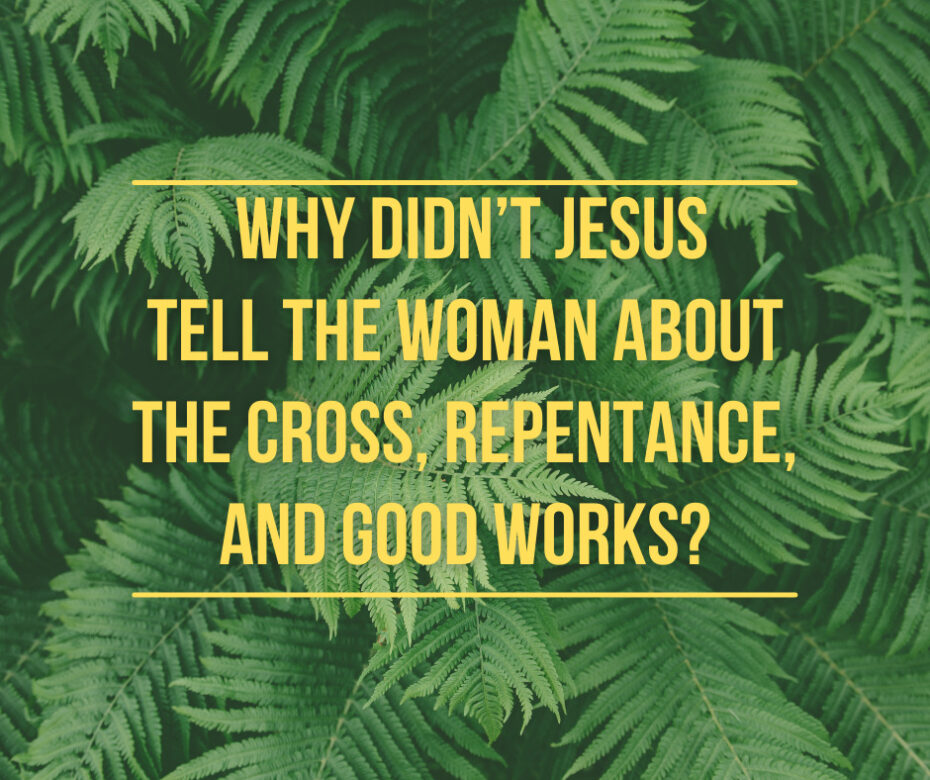WB raises an important question:
In the story of the woman at the well, Jesus told the woman essentially that she had to believe in Him to have everlasting life. Since His death and resurrection had not occurred yet, everlasting life seemed to be independent of believing in the work of Jesus on the cross. The two were earlier discussing the fact that He was the Messiah. So, does belief that Jesus is the Messiah count towards everlasting life? Works, baptism, living a pure life, and even repentance were not brought up. I am confused. I have always been taught that belief in the cross was essential for salvation. Can someone explain this or point me to a book or article to help?
Unless Jesus preached the cross to the woman at the well, something that John certainly would have reported, then she was born again without believing He had to shed His blood for her in order for her to have everlasting life. In fact, not even the apostles believed He was going to die (Matt 16:21-23). When Jesus revealed to the disciples that He was going to Jerusalem and would be put to death there, Peter said, “Far be it from You, Lord; this shall not happen to You!” (Matt 16:22). Yet all of the disciples, excluding Judas, were already born again (cf. Matt 16:16-17; John 2:11; 11:25-27; 13:10; 15:3; 20:31).
WB is correct that Jesus did not preach repentance to the woman at the well, either. In fact, it is quite telling that the words repent and repentance are not found at all in John’s Gospel.
The Lord never says in John’s Gospel that works are needed to be born again, to stay born again, or to prove that one is born again. The Lord Jesus repeatedly says that whoever simply believes in Him has everlasting life (John 3:16; 4:1-26; 5:24; 6:47; 11:25-27). In fact, He repeatedly stresses that he who believes in Jesus will never perish, will never hunger, will never thirst, will never come into judgment regarding his eternal destiny, will never be cast out, will never die spiritually (John 3:16; 5:24; 6:35, 37, 39; 11:26).
So, WB is right in his observation that the Lord Jesus taught that all who simply believe in Him for everlasting life have that life, independent of the person turning from his sins, living for Him, or even believing in His atoning work on the cross.
But wait. There is more.
Zane Hodges wrote two articles on how to lead a person to Christ. You can see Part 1 here and Part 2 here. In those articles he said that anyone who believes in Jesus for everlasting life has that life, even if the person does not know that Jesus died on the cross for the sins of the world.
However. Hodges also said, “So I find it not only useful, but indeed essential, to explain that the Lord Jesus Christ bought our way to heaven by paying for all our sins” (Part 1, p. 11).
Why would it be essential to explain the cross if it is not necessary to believe that?
The answer is simple, yet profound.
While Jesus was on earth and physically present, there was power in His presence. It was easier to believe His promise of everlasting life because of the authority of His teaching and, of course, the attesting miracles that He did.
But today we do not hear Him speak. We do not see Him, and we do not see Him perform miracles.
In a sense, it is harder to believe today. The Lord even hinted at that when He told Thomas, “Blessed are those who have not seen and yet have believed” (John 20:29).
Zane Hodges went on to say, “In recent years I have liked to emphasize that He paid for all the sins we would ever commit from the day of our birth to the day of our death. This serves to stress the completeness of the payment He made. It is usually only in the light of so perfect a payment that people can come to see the reasonableness of a salvation that is absolutely free” (Part 1, p. 11).
I’ve not met anyone who came to faith in Christ for everlasting life who did not first believe that He died on the cross for our sins and rose again. Believing those things is not a condition of everlasting life, as WB shows from John 4. Yet few, if any, on this side of the cross, have believed in Jesus for everlasting life without first knowing how it is that He could fulfill such an enormous promise.
I love WB’s question, because it raises the problems people have with regeneration by faith in Christ, apart from repentance and good works. And it raises two other vital issues. What is the precise object of saving faith? And what is the relationship between believing in Jesus’ death and resurrection and believing in Him for everlasting life?
If you have not read those two articles by Hodges, I highly recommend you take the time. You might also see this follow-up article by me.


